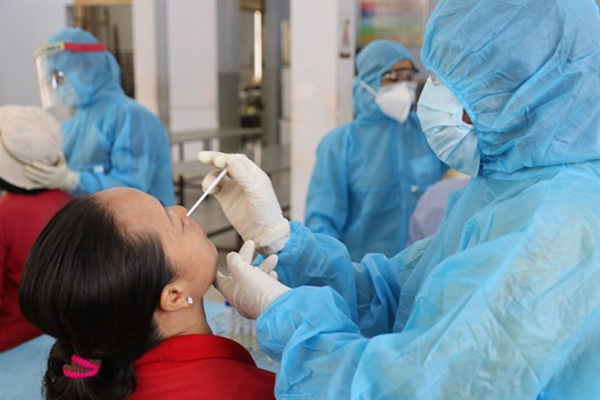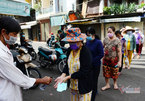 |
| Health workers take samples for COVID-19 tests at Thu Duc City’s Health Centre. Photo courtesy of Thu Duc City’s health centre |
The task forces led by the Department of Health will focus on high-risk areas such as industrial parks, export processing zones and high-tech zones.
Twenty-two of the task forces will work with leaders of People’s Committees in city districts and Thu Duc City to enhance prevention measures in those areas. The other three task forces will support management boards in export processing zones, industrial parks and high-tech parks, including the Quang Trung Software Park.
Task force members include representatives of the health department, the HCM City Centre for Disease Control (HCDC), students at medical universities, and members of youth unions.
Over the next two weeks, the health department will improve testing capacity to 1 million a day, especially in isolation and locked-down areas, to prevent cross-infection in these areas.
The city is piloting a programme to conduct rapid testing in the high-risk areas in order to detect positive cases as early as possible.
If there are negative results from the rapid tests, pooled samples of five to 10 will be tested by the more reliable and precise Realtime-PCR tests, with a goal of testing 1 million pooled samples per day, according to the department.
The advantage of rapid antigen testing is that it is convenient to use, gives quick results within 30 minutes, and can be used outside the laboratory to help detect suspected cases. The results of rapid antigen testing are, however, not as accurate as the RT-PCR method, which takes four to six hours to get results.
Tests by July 5
The city is speeding up screening tests in high-risk areas, ensuring quick results of less than 12 hours. It has already started taking testing samples from people in residential areas, industrial parks, export processing zones and hi-tech parks. They aim to test 5 million people by July 5.
To reduce the risk of cross-infection at concentrated medical isolation facilities, the Ministry of Health has issued specific guidelines for F1 cases (close contacts of COVID-19 patients) to isolate at home instead of in centralised quarantine areas.
The city has urged businesses to pay for the costs of COVID rapid tests for employees once a week.
It has also ordered the health sector officials to make their decisions on locking down areas within one hour after a COVID positive test is confirmed in an area.
Protection measures for health workers involved in examination and treatment of COVID patients must be ensured, and cross-infection at hospitals must be prevented.
The city plans to expand concentrated isolation areas to meet demand if the number of F1 cases increases rapidly. Hotels will also be used as isolation areas for F1 cases who will have to pay a fee to stay there.
The city has developed a scenario of 10,000 cases, including preparation for oxygen reserves, medical equipment and purchases of additional equipment for treatment.
The city’s vaccine-negotiation working group has been working with partners and manufacturers to speed up the progress of vaccine purchases. It has set a goal that by the end of the year about two-thirds of the city’s population will be vaccinated.
The city is also enhancing prevention measures at supermarkets, wholesale markets and traditional markets. Any place considered unsafe will be temporarily closed.
HCM City aims to curb Covid-19 outbreak in 12 days
Chairman of HCM City Nguyen Thanh Phong issued urgent directives to curb Covid-19 outbreak by July 10.
The Department of Information and Communication will work with the Department of Health to set up a database analysis centre to help direct prevention tasks. Local authorities were also asked for opinions.
If results comes back positive, authorities have one hour to lock down areas. They must carry out contact tracing tasks and collect samples for tests as quickly as possible. Monitoring inside quarantine centres and hospitals must be tightened to prevent cross-infection. Phong urged all agencies to speed up their work so that the Covid-19 test results will come back within 12 hours.
The authorities will keep test people in Thu Duc City, especially in areas with positive patients like District 8, Tan Phu, Hoc Mon and Binh Chanh districts. Firms are encouraged to buy quick tests for their employees once a week.
One hundred inspection teams have been set up to provide guidance to 22 firms on how to operate while staying in quarantine in several industrial zones and processing zones with 25,000 employees. Wholesale and wet markets that fail to meet Covid-19 prevention requirements will be closed.
Quarantine centres will be expanded or set up in case more F1 people are detected. However, the city will not use schools as quarantine centres. Hotels will be used as paid quarantine centres. F1 people can self-isolate at home if their living conditions meet the requirements.
HCM City has prepared plans and reviewed the oxygen and medical equipment in case there are 10,000 positive cases. The city authorities aim to vaccinate two-thirds of the population by the end of 2021.
Groups of more than three people in public places are banned.
Dong Nai requires negative test
From July 5 until further notice, all people entering Dong Nai Province from HCM City and Binh Duong Province to work are required to have a certificate for a negative COVID test taken within the last seven days before entry, as ordered by Dong Nai authorities.
Since the fourth wave in late April, Binh Duong has recorded more than 300 community-transmitted cases and HCM City nearly 4,000.
Workers have been urged to rent an accommodation near their workplaces in Dong Nai Province, HCM City or Binh Duong Province, instead of travelling back and forth daily.
Companies and production establishments in these localities should also arrange for workers to temporarily stay at the company under the guidance of the management boards of industrial parks.
People from HCM City and Binh Duong who are transiting through Dong Nai Province to other provinces are only required to complete a health declaration form at the provincial border (or previously on the Zalo app) and are not allowed to stop in Dong Nai to eat, drink or gather. They do not need to show a negative test result.
HCM City on Tuesday extended its current social distancing period until further notice as part of its effort to curb the highly contagious Delta variant and the increasing number of COVID-19 cases.
Since the fourth outbreak began at the end of April, the city as of Wednesday afternoon had recorded nearly 4,000 locally transmitted cases and 10 deaths.
Source: Vietnam News/Dtinews/VNN

HCM City extends social distancing as COVID-19 cases surge
Ho Chi Minh City, Vietnam’s busiest and most populous locality, is expected to extend social distancing which was imposed a month ago as the number of newly detected cases has increased considerably these days.